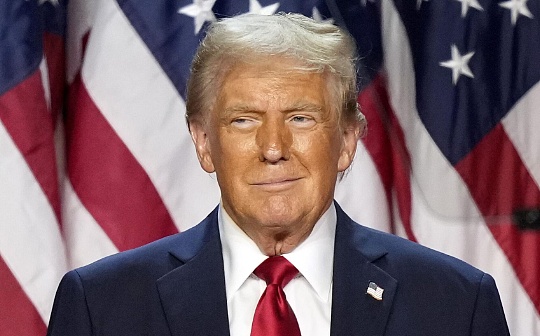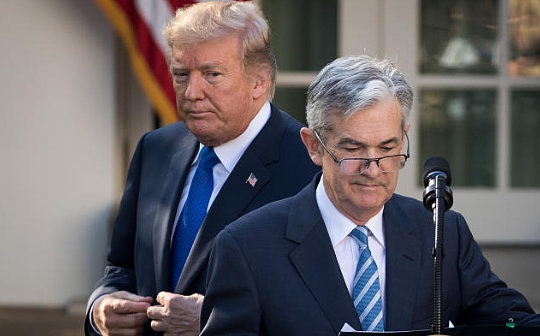
Author: Josh O’Sullivan, CoinTelegraph; Compiled by: Deng Tong, Bitchain Vision
As 2024 is coming to an end, there has been a big year for those who are driving and hindering the field.One side supports the technology and wants to push it forward, while the other side still doesn’t accept it or gives a bad reputation to crypto.
This article highlights seven promoters and seven blockers who support cryptocurrencies, who have a significant impact on the development of cryptocurrencies this year.
Fundamentalists who support cryptocurrencies
Donald Trump
Donald, the president-elect of the United StatesTrump has become an advocate for Bitcoin and cryptocurrencies this year, proposing to build Bitcoin reserves and promised that the United States will become the world’s “cryptocurrency capital.”
His speech at Bitcoin 2024 conference in Nashville was a critical moment in his campaign for cryptocurrency policy as he changed political narratives about BTC.
This is a huge shift compared to his 2021 view.At the time he said Bitcoin was “like a scam” and “don’t like it because it’s another currency that competes with the US dollar.”
Nayib Bukele
El Salvador President Nayib Bukele supports cryptocurrency adoption by continuing to use BTC as a fiat currency and through blockchain in his economy.
In a $1.4 billion loan agreement with the International Monetary Fund (IMF), the Bukele administration agreed to abandon some of its ongoing Bitcoin activities, but the National Bitcoin Office said it would “continue to buy one bitcoin every day.”
Hester Peirce
Hester Peirce, a SEC member known as the “cryptocurrency mom,” has been praised by the crypto community for her resistance to the institution and her claim to clarify how it handles its digital assets.
Peirce pushes reforms within the SEC to develop policies that support long-term growth of the cryptocurrency industry and unlock its potential innovations.
Brian Armstrong
Coinbase boss Brian Armstrong has been at the forefront of the 2024 crypto support wave, engaging with lawmakers on cryptocurrency issues and increasing support for cryptocurrencies in the United States, the United Kingdom and Australia through the Stand With Crypto lobbying group.
Coinbase has also been in the process of litigation with the SEC and has recently tried to push cryptocurrency companies to stop working with law firms that hire former SEC litigation lawyers.
Vitalik Buterin
Ethereum co-founder Vitalik Buterin continues to break through the boundaries of blockchain functions and further promote decentralization and crypto innovation.
From proposing modifications to Web3 wallets for increased security and privacy, to defending against cracked encryption, Buterin continues to promote encryption technology and methods to protect encryption in the financial field this year.
senatorCynthia Lummis
Senator Cynthia Lummis has been a staunch supporter of Capitol Hill cryptocurrency, put forward the idea of the U.S. government’s investment strategy for BTC and advocates for BTC in mainstream policy discussions.
Last November, Lummis said the U.S. Treasury Department should convert a portion of its 8,000 tonnes of gold to BTC to build a strategic reserve of cryptocurrencies.
She said the direct impact of the conversion on the U.S. government balance sheet would be “neutral” rather than spending about $90 billion to buy BTC at market prices.
Michael Saylor
MicroStrategy founder and Bitcoin bullisher Michael Saylor leads how public companies adopt BTC as their main treasury reserve asset and make huge windfalls from it.
With 439,000 BTC, MicroStrategy is pushing the company to surpass the value of well-known companies such as Nike and Starbucks.Saylor also tried to get Microsoft to participate in this action, but it failed, but it was a good attempt.
Restricting and hindering opposition parties in cryptocurrencies
SEC
In 2024, the Securities and Exchange Commission (SEC) gradually stepped up its crackdown on cryptocurrency companies through litigation and enforcement actions under Chairman Gary Gensler, adding uncertainty in the industrysex.
Gensler will resign in January.Gemini co-founder Tyler Winklevoss said no apology could “eliminate” the damage caused to the crypto industry by Gensler and his SEC.
UK FCA
The UK Financial Conduct Authority also continues to strengthen control over the cryptocurrency industry — like the SEC across the ocean — enforces rules that local industries believe will kill innovation and push cryptocurrency companies toward more friendly jurisdictionsdistrict.
The FCA recently issued warnings for unauthorized platforms, such as the Solana-based memecoin project Retardio and the memecoin generator Pump.fun.Pump.fun is allegedly banned by regulators in the UK for providing financial services without proper authorization.
Sahil Arora
Sahil Arora, known as the Meme coin mastermind, made her notorious in 2024 for launching numerous celebrity-recognized Meme coins, and was then yelled by some of them.

Source: Caitlyn Jenner
He allegedly worked with celebrities like Caitlyn Jenner, Rich the Kid and Iggy Azalea to convince them to promote Meme coins through social media.He allegedly sold his share of each token he held before the price plummeted.
Biden administration’s “Bottleneck 2.0 Action”
People in the cryptocurrency field have long accused President Joe Biden’s administration of a meticulously planned conspiracy to isolate cryptocurrencies from the banking system, known as Operation Bottleneck 2.0.
According to Marc Andreessen, co-founder of Andreessen Horowitz, more than 30 cryptocurrency and tech founders in the United States have been reportedly denied access to banking services.
On November 27, Coinbase’s Armstrong joined the accusation, saying it was one of the “most immoral and least American” things.
Dark Angels ransomware organization
The Dark Angels ransomware group, which dealt a severe blow to the cryptocurrency industry in 2024, is considered one of the most active cybercrime organizations in the industry to date.
According to a report by Chainalysis, the organization received the largest ransom of $75 million in BTC in July, marking a 96% increase in ransomware payments from 2023.
The organization has targeted centralized cryptocurrency exchanges to make the biggest impact by leveraging rising cryptocurrency prices and increased trading volumes.
Pig killing scam
Pig killing scams have become one of the most common forms of cryptocurrency-related fraud, with victims worldwide losing more than $75 billion.
These scams involve criminals building long-term, trust-based relationships online and ultimately forcing victims to participate in fake cryptocurrency investment programs.
On December 10, nearly 800 people were arrested on suspicion of participating in the crime in Lagos, Nigeria.
State-supported cybercrime
This year, state-supported cybercrime surged, and the infamous Lazarus Group, linked to North Korea, transferred more than $1 million in bitcoin in January after a period of silence.
Since 2017, the Lazarus Group has been linked to more than $3 billion worth of cryptocurrency thefts, including a $600 million Ronin Bridge hack.
The Elliptic 2024 report also shows that AI-powered tools fuel state-supported cybercrime, leading to deep fake promotions, ransomware attacks and other types of scams.
In short, 2024 launched a long tug-of-war between innovators, regulators, scammers and the state.
Cryptocurrencies are currently preparing for 2025, driven in large part by the U.S. government’s commitment to crypto-friendly and hopes that institutions continue to adopt.








